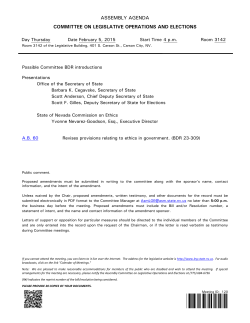
Ten Things to Know About Vote-A-Rama
Ten Things to Know About Vote-A-Rama This week, probably Thursday and into Friday, the Senate is expected to vote on its version of a budget resolution. As part of that process, more than 100 amendments may get voted in rapid succession in what is called “Vote-A-Rama.” Here are 10 things you need to know about Vote-A-Rama: 1. It’s “open mic night.” Any Senator can offer any amendment on any topic. 2. It’s as close to real democracy as the Senate gets. No filibusters, holds or cloture. Leadership cannot block or “fill the tree.” No debate as all time for discussion has expired… just voting. 3. It’s all for show. Even if the Senate passes an amendment 100-0, it carries no legal force. The budget is a non-binding “resolution” and cannot be vetoed or signed into law. 4. It’s all about politics. Both parties look to force politically-tough or embarrassing votes, setting up future campaign attacks and demagoguery. It’s speed dating for oppo researchers. 5. It’s hard to lobby. Many amendments are offered at the last minute to ambush others and avoid advocates. Votes occur in rapid succession without deliberation or debate, with all 100 Senators on the floor or in the Cloakroom and no longer reachable. 6. It’s over quickly. Several hundred amendments get floated initially, but Members usually withdraw those that are redundant or not top priorities. The effort gets old fast and Senators want to leave for spring break and foreign codels. 7. It doesn’t happen every year. No Vote-A-Rama was held for FY 2003, 2011, 2012 or 2013, when the Senate failed to pass a budget. 8. It has grown more political over time. Senators have been introducing more amendments and fighting fewer each year. In the ‘80s an average of 47 amendments were offered & 36% passed. In the ‘90s it was ~61 offered and 55% passed; the 2000s saw ~69 offered and 70% passed. 9. It’s politically revealing. In addition to Sen. Cruz, who has already announced his candidacy, four more sitting Senators may run for President (Paul, Rubio, Sanders & Warren). 2016 watchers will eagerly observe which amendments they introduce and support. 10. It “whip checks” the hottest issues. This year observers expect the following amendments, among many others: IMMIGRATION: Reversing the President’s 2014 Executive Order; re-passing the comprehensive reform bill that passed 69-31 in 2013. NET NEUTRALITY: Reversing the FCC vote to regulate the Internet as a utility. FOREIGN POLICY: Requiring Congressional approval for any nuclear arms deal with Iran. REPATRIATION: Allowing (or requiring) repatriation of U.S. corporate profits trapped abroad (by high U.S. rates) to fund infrastructure and/or sequestration relief. INVERSIONS: Punishing companies accused of avoiding taxes by reincorporating abroad. DEFENSE SPENDING: Avoiding $54 billion in defense spending cuts scheduled for FY 2016. HEALTH CARE: Repealing ACA & medical device tax; re-defining work week as “40 hours.” ENERGY: Accelerating export of liquefied natural gas & oil; reversing new EPA regulations. SURVEILLANCE: Limiting nat’l security surveillance of U.S. citizens or via commercial goods. TRADE: Promoting open markets through trade promotion authority. MARKETPLACE FAIRNESS: Levelling the playing field between online & offline sales taxes.
© Copyright 2025


















